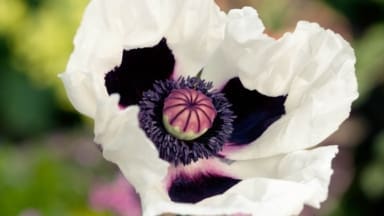
Papaver orientale and Colocasia were two plant groups identified by Plant Heritage as being at risk, as they weren’t part of a National Plant Collection. The charity has managed to attract new Collection Holders, protecting the plants for future generations.
Lorraine Vaun-Davis started her oriental poppy collection after reading about Plant Heritage’s Missing Collections list in 2020. Since then, Vaun-Davis’s colourful collection has grown to comprise 38 different cultivars, from hot pinks to deep reds, which are available to view in her Somerset garden.
Further South, avid plant collector Peter Davidson’s collection of 45 different Colocasia cultivars (elephants ears) is held in a large greenhouse in his Dorset garden. Despite the challenges of growing tropical Colocasia in a UK climate, Davidson is determined to collect and maintain as many cultivars as possible. He also plans to grow more plants and share them with others, which is a core part of Plant Heritage’s approach to plant conservation.
Gwen Hines, CEO, Plant Heritage, said: “Every year, we lose hundreds and possibly thousands of plants forever. This means we lose their beauty and history, as well as their benefits for biodiversity. Through Plant Heritage’s 45-year history, we have shown that National Plant Collections are a simple but effective way for the UK public to get involved in plant conservation. Together, our members are conserving around 95,000 plants for the future. We are incredibly grateful for plant enthusiasts like Lorraine and Peter who volunteer to take on this important work. I’d like to encourage more people to get in touch if they are interested in starting a National Collection or can support our work in other ways.”
Plant Heritage accredits new National Plant Collections every season. In addition to the new oriental poppy and Colocasia collections, the charity has accredited a further 13 collections this year, including:
- Daphne collection – also previously listed as a Missing Collection in 2020 – and a fig (Ficus carica) collection, which together brings RHS Garden Wisley’s total number of National Plant Collections to an impressive 18
- An extensive collection of over 12,000 seasonal Salvias from 200 different varieties, found in a two acre garden in Norfolk
- A historic collection of plants grown in the 1700s by London Bishop and plant collector Bishop Compton, held at Fulham Palace – the historic home of the Bishop of London. This new collection is part of wider restoration work to reintroduce several species that were cultivated by Bishop Compton between 1675 – 1713
- A new collection of Malus (crab apple cvs.) at The Newt in Somerset, which is the luxury hotel’s second National Plant Collection
- A Brugmansia collection in Devon that contains rare, unique and hard to source cultivars
- A pretty Geum coccineum & G. rivale collection which now includes plants from an existing Geum collection, to help ensure its future.
There are now over 720 different collections across the UK, amounting to over 95,000 plants. Collections are found everywhere from gardens, greenhouses, allotments, plant nurseries, arboretums, and botanic gardens, to more unusual settings such as a pub garden, a women’s prison, historic houses and zoos.

